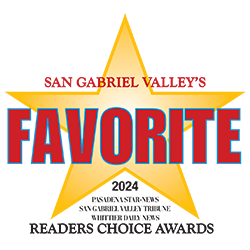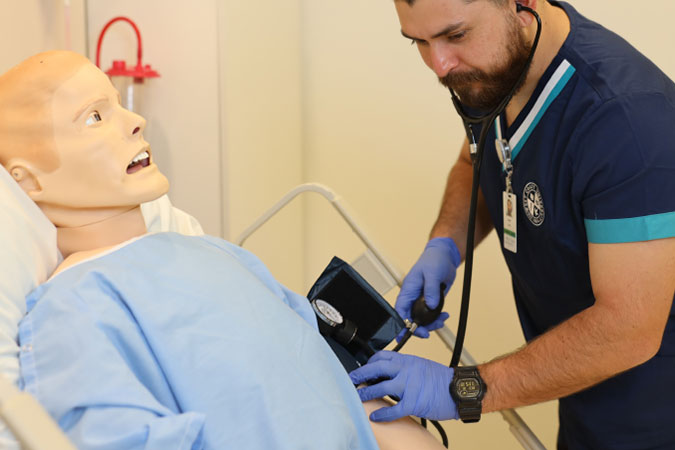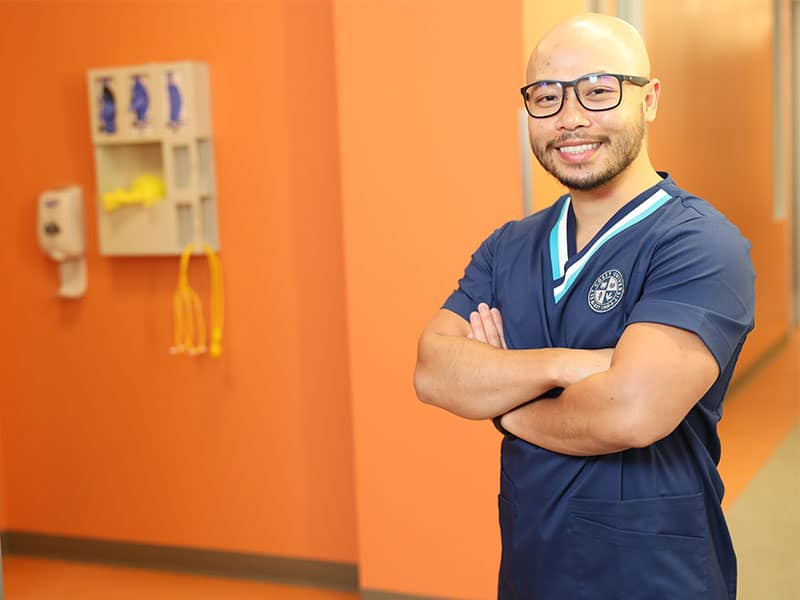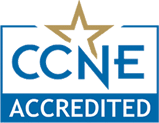Career
Nursing

The WCU Online Store is officially open. Visit Now.


10-week terms allow for start dates throughout the year
Earn your BSN in as few as 39 months at the Accelerated program pace
Complete 120 credits to earn your BSN degree

West Coast University Ontario has been voted as a FAVORITE in Career College/Trade School for the San Gabriel Valley Readers Choice Awards!

West Coast University Ontario has been voted as FAVORITE in four categories:
Technologically advanced simulation center for hands-on, independent training with manikins that are responsive in a range of practice scenarios
Professional development services and dedicated clinical advisors to assist with local, preference-aligned placements
No-cost tutoring, extensive study resources, and bootcamps for rigorous NCLEX-RN test preparation
Campus facilities designed for both individual and collaborative study
Embarking on a career as a registered nurse is the meaningful beginning to a profound life’s work. From physicians’ offices to hospital wards to home care, you bring care in all its forms to the bedside.
West Coast University Ontario is at the forefront of nursing education, preparing aspiring nurses for meaningful careers in a diverse range of specialty areas. At WCU-Ontario, you’ll engage with a faculty that includes industry leaders in practice and research. Our technologically advanced facilities offer lifelike simulations with high-fidelity manikins that mimic real patient behaviors, as well as interactive and augmented reality (AR) learning.
Meet West Coast University Alumna Kristina B., class of 2021, and discover why she choose WCU’s BSN program!
Simulation labs are an integral part of your nursing education at WCU. They are structured to help you practice skills and develop confidence BEFORE you begin your clinical rotations.
The students, past and present, along with the teaching staff at West Coast University share their top nursing school survival tips.
BSN Program Time to Completion
Designed for students who are eager to enter the workforce and can commit to full-time study, our BSN program at WCU-Ontario allows you to graduate with your degree in just over three years. On this timeline, you can learn the skills needed to begin your nursing career and practice as quickly as possible.
On-Campus
120 Credits
39 Months
8 Semesters
This curriculum applies to students matriculating or reentering after December 1, 2022.
All science courses must have been taken within the last five calendar years, unless the student possesses a degree or advanced degree in the specific field of study for which the student is seeking transfer credit. Additional information regarding transfer credit is located in the university’s catalog under Transfer Credit policy or below.
| Category and Requirements | WCU Course Requirements | Transferable / Options |
|---|---|---|
| Foundational Course | FYS 001 (0): First Year Seminar (only offered at Los Angeles and Ontario prior to Spring II 2024)
FHE 100 (3): Foundations of Higher Education (offered at all Campuses; Los Angeles and Ontario Campuses starting Spring II 2024) |
Non-transferable |
| A. Written Communication (6 Semester Credits) | * ENGL 140 (3): Written Communication I * ENGL 240 (3): Written Communication II |
Equivalent to ENGL 140 Equivalent to ENGL 240 |
| B. Oral and Interpersonal Communications (3 Semester Credits) |
*SPCH 142(3): Oral Communication | Equivalent to SPCH 142 |
| C. Critical Thinking and Ethical Reasoning (3 Semester Credits) |
*PHIL 341(3): Critical Reasoning | Equivalent to PHIL 341 |
| D. Quantitative Literacy (6 Semester Credits) |
MATH 108(3): College Mathematics I MATH 211(3): Statistics |
Equivalent to MATH 108
Equivalent to MATH 211 |
| E. Social and Behavioral Sciences Awareness (6 Semester Credits) |
*PSYC 160(3): Psychology *PSYC 290(3): Life Span Psychology |
Equivalent to PSYC 160 Equivalent to PSYC 290 |
| F. Historical, Cultural, and Aesthetic Recognition (3 Semester Credits) |
* HUM 370 (3): Cultural Pluralism | Equivalent to HUM 370 |
| G. Scientific Reasoning (16 Semester Credits) |
ANAT 260(4): Human Anatomy PHYS 261(4): Human Physiology CHEM 280(4): Chemistry MICR 290(4): General Microbiology |
|
| General Education Capstone (3 Semester Credits) |
CAPS 401(3): General Education Capstone (only offered at Los Angeles, Ontario Campuses prior to Spring II 2024) |
Non-transferable |
| A minimum of 46 credits is required for graduation. | ||
| General Education within the Area of Study | ||
| PATH 370 | Pathophysiology | 3 |
| PHIL 434 | Medical Ethics and Issues | 3 |
| Total Credit Hours: | 6 | |
| Core Nursing Courses | ||
| NURS 100 | Fundamentals of Nursing | 3 |
| NURS 101L | Fundamentals of Nursing Skills Lab | 2 |
| NURS 110 | Introduction to Professional Nursing | 2 |
| NURS 120 | Introduction to Medical Surgical Nursing | 3 |
| NURS 121L-A | Introduction to Medical Surgical Nursing Practicum | 2 |
| NURS 121L-B | Introduction to Medical Surgical Nursing Practicum – On-Campus | 1 |
| NURS 180 | Pharmacology | 3 |
| NURS 190 | Physical Assessment | 2 |
| NURS 201 | Medical Surgical Nursing-Promoting Wellness | 3 |
| NURS 211L | Medical Surgical Nursing | 3 |
| NURS 222 | Mental Health/Psychiatric Nursing: Promoting Wellness in the Mentally Ill | 3 |
| NURS 223L | Mental Health/Psychiatric Nursing: Promoting Wellness Practicum | 2 |
| NURS 225 | Nutrition in Health and Disease | 3 |
| NURS 306 | Expanding Family and Community (OB) | 2 |
| NURS 307 | Developing Family and Community (PEDS) | 2 |
| NURS 316L-A | Expanding and Developing Family and Community Practicum (OB) | 1.5 |
| NURS 317L-A | Developing Family and Community Practicum (PEDS) | 1.5 |
| NURS 340 | Public Health Nursing | 3 |
| NURS 342L | Public Health Nursing Practicum | 2 |
| NURS 350 | Research in Nursing | 3 |
| NURS 420 | Principles of Leadership and Management | 3 |
| NURS 431 | Disaster Management | 2 |
| NURS 440 | Issues and Trends in Nursing | 3 |
| NURS 480 | Advanced Medical Surgical Nursing: Promoting Wellness Practicum | 3 |
| NURS 481L | Advanced Medical Surgical Nursing: Promoting Wellness Practicum | 3 |
| NURS 493* | Integration of Nursing Concepts | 3 |
| NURS 497 | Nursing Capstone | 1 |
| NURS 498L | Integration of Nursing Practices | 3 |
| Total Credit Hours: | 68.0 | |
| Program Credit Distribution | ||
| General Education Semester Credits | 46.0 | |
| General Education within the Area of Study | 6.0 | |
| Core Nursing Courses | 68.0 | |
| Total Program Semester Credits | 120.0 | |
We know school is a substantial commitment. At WCU, we want to equip you with all the information you need to make the right decision for your future.
Our goal is to give you a clear understanding of Bachelor of Science in Nursing tuition costs so you can be well-informed as you navigate the application and enrollment process. To assist you in your decision, we provide a breakdown below of the Bachelor of Science in Nursing program costs in Ontario at West Coast University.
We offer several financial aid options — including scholarships, grants, and loan access — to help support you through your studies. For more information about your financial support options, visit our Financial Aid page.
Estimated Cost of Attendance is comprised of both direct costs and indirect costs, as outlined in the charts below. The purpose of the Cost of Attendance (COA) is to provide students and families with an estimated cost to attend West Coast University. The COA includes both direct and indirect cost estimates and are categorized as follows: (1) Direct costs are paid directly to West Coast University and are shown separately for each program; (2) Indirect costs are not paid to West Coast University and are estimates students may use to budget expenses they may incur while attending school. While actual indirect costs may vary, West Coast University estimates these amounts based on the number of months in an academic year and whether students will live with parents or off campus.
Direct Costs
| Degree Type | (Starting Fall I 2024) | (Starting Fall II 2024) |
| Total Program Credits | 120 | 120 |
| Program Length(Full-Time) | 8 semesters | 8 semesters |
| Full-Time Status(12 to 18 credits) | $18,250 | $15,000 |
| 3/4-Time Status(9 to 11 credits) | $15,212 | $12,450 |
| 1/2-Time Status(6 to 8 credits) | $11,810 | $9,750 |
| Less than 1/2-Time Status(under 6 credits) (per credit) | $2,026 | $1,665 |
| Total Tuition Costs(Full-Time) | $146,000 | $120,000 |
| Registration Fee(refundable) | $75 | $75 |
| STRF Fee1(non-refundable) | $0 | $0 |
| Estimated Total Book Costs2 | $5,262 | $5,262 |
| Estimated Total Book Shipping Cost2 | $526 | $526 |
| Estimate for Uniforms Fees2 | $250 | $250 |
| Estimate for Supplies &Licensure Preparation Fees2 | $2,345 | $2,345 |
| Technology Fee3($100 per semester) | $800 | $800 |
| General Education Resource Fee4 | $500 | $500 |
| Core Nursing Fee5 | $26,000 | |
| Estimated Total Program Costs | $155,758 | $155,758 |
Indirect Costs:
| 10 Month Academic Year | ||||
| Prior to Fall 1 2025 | Starting Fall I 2025 | |||
| with parents | off campus | with parents | off campus | |
| Federal Student Loan Fees | $100 | $100 | $100 | $100 |
| Course Materials (Personal Electronic Device-1st year only) | $1,000 | $1,000 | $1,000 | $1,000 |
| Living Expenses (Food & Housing) | $3,120 | $10,410 | $3,270 | $10,910 |
| Transportation | $2,160 | $2,160 | $2,200 | $2,200 |
| Miscellaneous Personal Expenses | $7,070 | $7,070 | $7,070 | $7,070 |
| Total | $13,450 | $20,740 | $13,660 | $21,300 |
1 Effective April 1, 2024, the Student Tuition Recovery Fund (STRF) assessment rate will be zero dollars and zero cents ($0.00) per one thousand dollars ($1,000) of institutional charges.
The State of California established the Student Tuition Recovery Fund (STRF) to relieve or mitigate economic loss suffered by a student in an educational program at a qualifying institution, who is or was a California resident while enrolled, or was enrolled in a residency program, if the student enrolled in the institution, prepaid tuition, and suffered an economic loss. Unless relieved of the obligation to do so, you must pay the state-imposed assessment for the STRF, or it must be paid on your behalf, if you are a student in an educational program, who is a California resident, or are enrolled in a residency program, and prepay all or part of your tuition.
You are not eligible for protection from the STRF and you are not required to pay the STRF assessment, if you are not a California resident, or are not enrolled in a residency program.
It is important that you keep copies of your enrollment agreement, financial aid documents, receipts, or any other information that documents the amount paid to the school. Questions regarding the STRF may be directed to the Bureau for Private Postsecondary Education, 1747 N. Market Blvd. Ste 225 Sacramento, CA 95834, (916) 431-6959 or (888) 370-7589.
To be eligible for STRF, you must be a California resident or enrolled in a residency program, prepaid tuition, paid or deemed to have paid the STRF assessment, and suffered an economic loss as a result of any of the following:
To qualify for STRF reimbursement, the application must be received within four (4) years from the date of the action or event that made the student eligible for recovery from STRF.
A student whose loan is revived by a loan holder or debt collector after a period of noncollection may, at any time, file a written application for recovery from STRF for the debt that would have otherwise been eligible for recovery. If it has been more than four (4) years since the action or event that made the student eligible, the student must have filed a written application for recovery within the original four (4) year period, unless the period has been extended by another act of law.
However, no claim can be paid to any student without a social security number or a taxpayer identification number.
2 The Estimate for Book, Uniform, and Supply fees reflect the Manufacturer’s Suggested Retail Price totals compiled in December 2024 and are subject to change. Supplies become student purchases once issued to student. Students who drop or have been dismissed after supplies have been issued will assume ownership for these items and will not be eligible for refunds. For details on all of the supplies, contact the Student Accounts Office.
BSN | Supplies issued in NURS 101L Fundamentals of Nursing Skills Lab.
3 Technology Fee includes student technical support, Office 365, blended and online course delivery/learning management system, mobile app, student portal technology and access, and required electronic course materials/software.
4 The General Education Resource Fee includes costs associated with lab supplies and materials, Labster virtual labs and simulations, and Tutor.com access.
5 The Core Nursing Fee will be billed each semester in which Core Nursing courses are scheduled and covers costs associated with background checks and drug screenings; the operation of equipment for Simulation, Technology, including but not limited to the establishment, scheduling, coordination, site visits, on-going management, and other expenses related to clinical activities. 5 Core Nursing Semesters multiplied by $5,408 per Core Nursing Semester effective Fall I 2025 and $5,200 per Core Nursing Semester prior to Fall I 2025.
Note 1: Students who wish to take Challenge Exams will be subject to a fee of $100 for each Challenge exam. Please see the campus Student Accounts Office for a full price listing.
Note 2: Course Audit Policy – Students auditing a course are not charged tuition or fees for the audited course. However, if a student enrolls in both an audit course and a credit-bearing course in the same semester/trimester, they will be responsible for the tuition and applicable fees associated with the credit-bearing course.
Note 3: The Total Tuition Cost can be converted to Cost per Credit Hour by using the following calculation:
If enrolled prior to Fall II 2024, Total Tuition Cost (Prior to Fall I 2025) ($146,000) divided by the Total Program Credits (120) = Cost Per Credit Hour ($1,216.67).
If enrolled after Fall II 2024, Total Tuition Cost (Prior to Fall I 2025) ($120,000) divided by the Total Program Credits (120) = Cost Per Credit Hour ($1,000.00).
If enrolled prior to Fall II 2024, Total Tuition Cost (Starting Fall I 2025) ($151,840) divided by the Total Program Credits (120) = Cost Per Credit Hour ($1,265.33).
If enrolled after Fall II 2024, Total Tuition Cost (Starting Fall I 2025) ($124,800) divided by the Total Program Credits (120) = Cost Per Credit Hour ($1,040.00).
Direct Costs
| Degree Type | Start Date prior to Fall II 2024 | Start Date on and after Fall II 2024 |
| Total Program Credits | 120 | 120 |
| Program Length(Full-Time) | 8 semesters | 8 semesters |
| Full-Time Status(12 to 18 credits) | $18,250 | $15,000 |
| 3/4-Time Status(9 to 11 credits) | $15,212 | $12,450 |
| 1/2-Time Status(6 to 8 credits) | $11,810 | $9,750 |
| Less than 1/2-Time Status(under 6 credits) (per credit) | $2,026 | $1,665 |
| Total Tuition Costs(Full-Time) | $146,000 | $120,000 |
| Registration Fee(refundable) | $75 | $75 |
| STRF Fee1(non-refundable) | $0 | $0 |
| Estimated Total Book Costs2 | $4,214 | $4,214 |
| Estimated Total Book Shipping Cost2 | $421 | $421 |
| Estimate for Uniforms Fees2 | $250 | $250 |
| Estimate for Supplies &Licensure Preparation Fees2 | $4,200 | $4,200 |
| Technology Fee3($100 per semester) | $800 | $800 |
| General Education Resource Fee4 | $500 | $500 |
| Core Nursing Fee5 | $26,000 | |
| Estimated Total Program Costs | $156,460 | $156,460 |
Indirect Costs:
| 10 Month Academic Year | ||||
| Prior to Fall 1 2025 | Starting Fall I 2025 | |||
| with parents | off campus | with parents | off campus | |
| Federal Student Loan Fees | $100 | $100 | $100 | $100 |
| Course Materials (Personal Electronic Device-1st year only) | $1,000 | $1,000 | $1,000 | $1,000 |
| Living Expenses (Food & Housing) | $3,120 | $10,410 | $3,270 | $10,910 |
| Transportation | $2,160 | $2,160 | $2,200 | $2,200 |
| Miscellaneous Personal Expenses | $7,070 | $7,070 | $7,070 | $7,070 |
| Total | $13,450 | $20,740 | $13,660 | $21,300 |
1 Effective April 1, 2024, the Student Tuition Recovery Fund (STRF) assessment rate will be zero dollars and zero cents ($0.00) per one thousand dollars ($1,000) of institutional charges.
The State of California established the Student Tuition Recovery Fund (STRF) to relieve or mitigate economic loss suffered by a student in an educational program at a qualifying institution, who is or was a California resident while enrolled, or was enrolled in a residency program, if the student enrolled in the institution, prepaid tuition, and suffered an economic loss. Unless relieved of the obligation to do so, you must pay the state-imposed assessment for the STRF, or it must be paid on your behalf, if you are a student in an educational program, who is a California resident, or are enrolled in a residency program, and prepay all or part of your tuition.
You are not eligible for protection from the STRF and you are not required to pay the STRF assessment, if you are not a California resident, or are not enrolled in a residency program.
It is important that you keep copies of your enrollment agreement, financial aid documents, receipts, or any other information that documents the amount paid to the school. Questions regarding the STRF may be directed to the Bureau for Private Postsecondary Education, 1747 N. Market Blvd. Ste 225 Sacramento, CA 95834, (916) 431-6959 or (888) 370-7589.
To be eligible for STRF, you must be a California resident or enrolled in a residency program, prepaid tuition, paid or deemed to have paid the STRF assessment, and suffered an economic loss as a result of any of the following:
To qualify for STRF reimbursement, the application must be received within four (4) years from the date of the action or event that made the student eligible for recovery from STRF.
A student whose loan is revived by a loan holder or debt collector after a period of noncollection may, at any time, file a written application for recovery from STRF for the debt that would have otherwise been eligible for recovery. If it has been more than four (4) years since the action or event that made the student eligible, the student must have filed a written application for recovery within the original four (4) year period, unless the period has been extended by another act of law.
However, no claim can be paid to any student without a social security number or a taxpayer identification number.
2 The Estimate for Book, Uniform, and Supply fees reflect the Manufacturer’s Suggested Retail Price totals compiled in December 2024 and are subject to change. Supplies become student purchases once issued to student. Students who drop or have been dismissed after supplies have been issued will assume ownership for these items and will not be eligible for refunds. For details on all of the supplies, contact the Student Accounts Office.
BSN | Supplies issued in NURS 101L Fundamentals of Nursing Skills Lab.
3 Technology Fee includes student technical support, Office 365, blended and online course delivery/learning management system, mobile app, student portal technology and access, and required electronic course materials/software.
4 The General Education Resource Fee includes costs associated with lab supplies and materials, Labster virtual labs and simulations, and Tutor.com access.
5 The Core Nursing Fee will be billed each semester in which Core Nursing courses are scheduled and covers costs associated with background checks and drug screenings; the operation of equipment for Simulation, Technology, including but not limited to the establishment, scheduling, coordination, site visits, on-going management, and other expenses related to clinical activities. 5 Core Nursing Semesters multiplied by $5,408 per Core Nursing Semester effective Fall I 2025 and $5,200 per Core Nursing Semester prior to Fall I 2025.
Note 1: Students who wish to take Challenge Exams will be subject to a fee of $100 for each Challenge exam. Please see the campus Student Accounts Office for a full price listing.
Note 2: Course Audit Policy – Students auditing a course are not charged tuition or fees for the audited course. However, if a student enrolls in both an audit course and a credit-bearing course in the same semester/trimester, they will be responsible for the tuition and applicable fees associated with the credit-bearing course.
Note 3: The Total Tuition Cost can be converted to Cost per Credit Hour by using the following calculation:
If enrolled prior to Fall II 2024, Total Tuition Cost (Prior to Fall I 2025) ($146,000) divided by the Total Program Credits (120) = Cost Per Credit Hour ($1,216.67).
If enrolled after Fall II 2024, Total Tuition Cost (Prior to Fall I 2025) ($120,000) divided by the Total Program Credits (120) = Cost Per Credit Hour ($1,000.00).
If enrolled prior to Fall II 2024, Total Tuition Cost (Starting Fall I 2025) ($151,840) divided by the Total Program Credits (120) = Cost Per Credit Hour ($1,265.33).
If enrolled after Fall II 2024, Total Tuition Cost (Starting Fall I 2025) ($124,800) divided by the Total Program Credits (120) = Cost Per Credit Hour ($1,040.00).
Direct Costs
| Degree Type | Start Date prior to Fall II 2024 | Start Date on and after Fall II 2024 |
| Total Program Credits | 120 | 120 |
| Program Length(Full-Time) | 8 semesters | 8 semesters |
| Full-Time Status(12 to 18 credits) | $18,980 | $15,600 |
| 3/4-Time Status(9 to 11 credits) | $15,820 | $12,950 |
| 1/2-Time Status(6 to 8 credits) | $12,282 | $10,140 |
| Less than 1/2-Time Status(under 6 credits) (per credit) | $2,107 | $1,732 |
| Total Tuition Costs(Full-Time) | $151,840 | $124,800 |
| Registration Fee(refundable) | $75 | $75 |
| STRF Fee1(non-refundable) | $0 | $0 |
| Estimated Total Book Costs2 | $4,006 | $4,006 |
| Estimated Total Book Shipping Cost2 | $401 | $401 |
| Estimate for Uniforms Fees2 | $250 | $250 |
| Estimate for Supplies &Licensure Preparation Fees2 | $4,200 | $4,200 |
| Technology Fee3($100 per semester) | $800 | $800 |
| General Education Resource Fee4 | $500 | $500 |
| Core Nursing Fee5 | $27,040 | |
| Estimated Total Program Costs | $162,072 | $162,072 |
Indirect Costs:
| 10 Month Academic Year | ||||
| Prior to Fall 1 2025 | Starting Fall I 2025 | |||
| with parents | off campus | with parents | off campus | |
| Federal Student Loan Fees | $100 | $100 | $100 | $100 |
| Course Materials (Personal Electronic Device-1st year only) | $1,000 | $1,000 | $1,000 | $1,000 |
| Living Expenses (Food & Housing) | $3,120 | $10,410 | $3,270 | $10,910 |
| Transportation | $2,160 | $2,160 | $2,200 | $2,200 |
| Miscellaneous Personal Expenses | $7,070 | $7,070 | $7,070 | $7,070 |
| Total | $13,450 | $20,740 | $13,660 | $21,300 |
1 Effective April 1, 2024, the Student Tuition Recovery Fund (STRF) assessment rate will be zero dollars and zero cents ($0.00) per one thousand dollars ($1,000) of institutional charges.
The State of California established the Student Tuition Recovery Fund (STRF) to relieve or mitigate economic loss suffered by a student in an educational program at a qualifying institution, who is or was a California resident while enrolled, or was enrolled in a residency program, if the student enrolled in the institution, prepaid tuition, and suffered an economic loss. Unless relieved of the obligation to do so, you must pay the state-imposed assessment for the STRF, or it must be paid on your behalf, if you are a student in an educational program, who is a California resident, or are enrolled in a residency program, and prepay all or part of your tuition.
You are not eligible for protection from the STRF and you are not required to pay the STRF assessment, if you are not a California resident, or are not enrolled in a residency program.
It is important that you keep copies of your enrollment agreement, financial aid documents, receipts, or any other information that documents the amount paid to the school. Questions regarding the STRF may be directed to the Bureau for Private Postsecondary Education, 1747 N. Market Blvd. Ste 225 Sacramento, CA 95834, (916) 431-6959 or (888) 370-7589.
To be eligible for STRF, you must be a California resident or enrolled in a residency program, prepaid tuition, paid or deemed to have paid the STRF assessment, and suffered an economic loss as a result of any of the following:
To qualify for STRF reimbursement, the application must be received within four (4) years from the date of the action or event that made the student eligible for recovery from STRF.
A student whose loan is revived by a loan holder or debt collector after a period of noncollection may, at any time, file a written application for recovery from STRF for the debt that would have otherwise been eligible for recovery. If it has been more than four (4) years since the action or event that made the student eligible, the student must have filed a written application for recovery within the original four (4) year period, unless the period has been extended by another act of law.
However, no claim can be paid to any student without a social security number or a taxpayer identification number.
2 The Estimate for Book, Uniform, and Supply fees reflect the Manufacturer’s Suggested Retail Price totals compiled in December 2024 and are subject to change. Supplies become student purchases once issued to student. Students who drop or have been dismissed after supplies have been issued will assume ownership for these items and will not be eligible for refunds. For details on all of the supplies, contact the Student Accounts Office.
BSN | Supplies issued in NURS 101L Fundamentals of Nursing Skills Lab.
3 Technology Fee includes student technical support, Office 365, blended and online course delivery/learning management system, mobile app, student portal technology and access, and required electronic course materials/software.
4 The General Education Resource Fee includes costs associated with lab supplies and materials, Labster virtual labs and simulations, and Tutor.com access.
5 The Core Nursing Fee will be billed each semester in which Core Nursing courses are scheduled and covers costs associated with background checks and drug screenings; the operation of equipment for Simulation, Technology, including but not limited to the establishment, scheduling, coordination, site visits, on-going management, and other expenses related to clinical activities. 5 Core Nursing Semesters multiplied by $5,408 per Core Nursing Semester effective Fall I 2025 and $5,200 per Core Nursing Semester prior to Fall I 2025.
Note 1: Students who wish to take Challenge Exams will be subject to a fee of $100 for each Challenge exam. Please see the campus Student Accounts Office for a full price listing.
Note 2: Course Audit Policy – Students auditing a course are not charged tuition or fees for the audited course. However, if a student enrolls in both an audit course and a credit-bearing course in the same semester/trimester, they will be responsible for the tuition and applicable fees associated with the credit-bearing course.
Note 3: The Total Tuition Cost can be converted to Cost per Credit Hour by using the following calculation:
If enrolled prior to Fall II 2024, Total Tuition Cost (Prior to Fall I 2025) ($146,000) divided by the Total Program Credits (120) = Cost Per Credit Hour ($1,216.67).
If enrolled after Fall II 2024, Total Tuition Cost (Prior to Fall I 2025) ($120,000) divided by the Total Program Credits (120) = Cost Per Credit Hour ($1,000.00).
If enrolled prior to Fall II 2024, Total Tuition Cost (Starting Fall I 2025) ($151,840) divided by the Total Program Credits (120) = Cost Per Credit Hour ($1,265.33).
If enrolled after Fall II 2024, Total Tuition Cost (Starting Fall I 2025) ($124,800) divided by the Total Program Credits (120) = Cost Per Credit Hour ($1,040.00).
For Admissibility into the BSN & LVN-BSN Program, Applicants Must Meet the Following Requirements:
Pre-Licensure Nursing Requirements prior to clinical assignments (ADN, BSN & LPN to BSN):
To receive transfer credit for this program, previous General Education course must have achieve a grade of at least a “C”, and Core courses require a minimum grade of a “C+”. Approval on transfer credit is based on the program’s discretion.
BSN or LVN-BSN applicants requesting transfer credit evaluation must provide the applicable official transcripts by seven (7) calendar days before the start of the term. All general education, prerequisite, and core nursing coursework must have been taken at an appropriately accredited institution. For nursing credits to be considered for transfer credit, there can be only one year between the end of the last nursing course taken at a previous institution and the beginning of the first course at West Coast University. Exceptions may be considered. Science courses must be taken within the last five years to be accepted for transfer credit. Course syllabi for courses previously taken at another nursing program should be submitted for review to the campus dean for nursing. The maximum allowable transfer credits applied to the BSN program shall not exceed 52 credits of general education. See the Challenge Credit policy for additional information on receiving nursing credit for previously completed nursing courses. Authority for all final transfer credit decisions is given to the Program Dean/Chair.
Transfer credit will not be awarded based on unofficial transcripts and all, however, students will may be scheduled for their first semester of courses based on unofficial transfer credit review . Financial packaging for the first semester will be estimated without transfer credit unless/until official transcripts are received and evaluated. If transfer credit is evaluated after the add/drop date of the first semester, it will be reflected in financial aid offers for the subsequent semester.
BSN & LVN-BSN Postsecondary Transcripts for Veterans
All applicants who are veterans or seeking transfer credits must submit all official applicable postsecondary transcripts by seven (7) calendar days before the start of the term regardless of applicable transfer credits for timely certification of the veterans request for benefits and receipt of funds. Please see the Veterans Educational Benefits policy in the Financial Policies and Information Section of the Catalog.
For additional information, visit our catalog.
New academic terms begin, on average, every 10 weeks. To get an idea of when each term starts and ends, view our Academic Calendar.

WCU-Ontario offers an education that keeps pace with technology. As a student, you’ll enjoy access to technology-forward simulation labs where you’ll participate in hands-on learning with manikins developed to respond and behave just like live patients, from biological responses like blood pressure variation to behavioral reactions like tears of pain.
You’ll participate in a range of scenarios from routine exams to patient crashes so you’ll be well-equipped when the time comes to respond to a patient in real life.
Our simulations are programmed for a range of experience scenarios, including;
Attend an info session to learn what all the buzz is about.
As part of your BSN program, you will be required to complete a certain number of clinical hours at a practice site so you can gain hands-on practice for your future nursing career. The WCU Clinical Placements team is dedicated to helping our students place locally, and in a practicum that matches their interests and licensure goals. This team not only assists with placement but helps streamline approvals and track compliance to safeguard the integrity of your placement.

To become licensed as a registered nurse, you will need to take the National Council Licensure Exam (NCLEX). This exam tests the skills and knowledge you learned in your BSN program and clears you for practice.
The WCU-Ontario BSN program includes critical preparation to take and pass the NCLEX-RN. Support includes study guides, no-cost tutors, bootcamps, and NCLEX-RN advisors, so you’ll have all the materials and guidance you need to walk into the test prepared.
As a WCU-Ontario student, and later a graduate, you have access to our Career Services team for professional development and assistance with your job search.1 Receive help with career planning, interview preparation and locating open positions.
In your career as an RN, you may choose to work within a specialization such as cardiovascular, addiction treatment, neonatal care, critical care, genetics, nephrology, or public health.2 Career services can provide guidance in how to focus your job search and career planning.
Upon graduation from West Coast University, students will have met the following program learning outcomes:

Vina Ocampo is the Campus Dean of Nursing for West Coast University’s Ontario campus. Dean Ocampo started her humble beginnings as a certified nurse assistant (CNA) over 15 years ago. She overcame many personal adversities as a young, single mother in the early pursuit of her nursing career to serve others selflessly and become self-sufficient.
As a first-generation Filipino American and the first in her family to achieve her registered nurse (RN) license in the United States, Dean Ocampo remains passionate about mentoring and empowering today’s new generation of nurses to positively impact and contribute to the future of nursing.
With her emergency and critical-care clinical background, Dean Ocampo remains driven to learn more, so she never stopped pursuing her higher education. As a result, she has had many opportunities to serve as a professor, director, and dean in higher education institutions. She has also served as a nurse educator in community and hospital settings, and also as a Director of Clinical Education overseeing new graduate RN residency programs and preceptorships.
Dean Ocampo is currently in her dissertation phase for completion of her PhD in Nursing at Loma Linda University with a focus on healthy work environments (HWE) and its influence on burnout in critical care nursing pre- and post-COVID-19.
Dean Ocampo has a Master of Science in Nursing Leadership and a Bachelor of Science in Nursing from California State University, Fullerton, as well as an Associate of Science in Nursing from Riverside City College. She remains a licensed RN, public health nurse (PHN), and Certified Higher Education Professional (CHEP).
Dean Ocampo is a proud member of the American Association of Critical Care Nurses (AACN), the Association of California Nurse Leaders (ACNL), the Inland Empire Health Care Education Consortium (IEHEC), Nurses Bond, Inc., and Sigma Theta Tau (Chi Mu and Upsilon Beta chapters). To pay it forward to the next generation or aspiring nurses, Dean Ocampo serves on the School of Career Education Occupational Advisory Committee for the Riverside County Office of Education, which is where she originally achieved her certification as a nurse assistant.
At WCU-Ontario, you can earn your Bachelor of Science in Nursing degree in 39 months (a little over three years).
Yes. Our BSN program at WCU is intended for any individual who wants to become a registered nurse regardless of any other undergraduate degrees they already have.
At WCU, we have nursing, healthcare, and business graduate programs available for BSN graduates who are interested in continuing their education. One of our more popular options for BSN graduates is our Master of Science in Nursing (MSN) program, through which students can choose a nursing specialization. (We have both advanced practice registered nurse (APRN) tracks and non-APRN specialty tracks available). We also have an RN to MSN program for students who will begin their program after obtaining their RN licensure (no bachelor’s degree required).
Additional programs include our Master of Public Health, Master of Health Administration, and our Master of Business Administration programs.
An RN designation is a state-issued license that allows someone to work as a registered nurse. On the other hand, a Bachelor of Science in Nursing (BSN) is a degree from an accredited institution that can help someone prepare for licensure and a career as a registered nurse. A BSN prepares you for practice as an RN and to pass the required licensure exam (NCLEX-RN), but you do not have to hold a BSN degree to pursue RN licensure.
Many aspiring nurses choose to pursue a BSN degree to give them a greater advantage in their future career. According to the American Association of Colleges of Nursing (AACN), 77.4% of employers are expressing a strong preference for BSN program graduates.3
Eligible BSN candidates may apply for available financial aid and scholarships. You can find information and instructions for scholarships available at WCU-Ontario, such as the Centennial Merit Scholarship on the Undergraduate On-Ground Scholarships and Grants page of our online catalog. You’re also welcome to consult with our WCU-Ontario team of financial aid advisors, who can help you find ways to finance your Bachelor of Science in Nursing degree. More information is available on our Financial Aid page.
West Coast University
2855 E. Guasti Rd
Ontario, CA 91761
(909) 467-6100

The baccalaureate degree program in nursing, master’s degree program in nursing, Doctor of Nursing Practice program, and post-graduate APRN certificate program at West Coast University are accredited by the Commission on Collegiate Nursing Education 655 K Street, Suite 750, Washington DC 20001, (202) 877-6791 (www.ccneaccreditation.org).
Pursuing your degree is a big choice. Fill out our form and one of our admissions advisors will contact you to answer any questions you may have!
1 WCU provides career guidance and assistance but cannot guarantee employment.
2 Bureau of Labor Statistics, U.S. Department of Labor, Occupational Outlook Handbook, Registered Nurses, “Work Environment,” Updated Sept. 8, 2022
*The views and opinions expressed are those of the individuals and do not necessarily reflect the beliefs or position of the school or of any instructor or student.
Financial aid and scholarships are available for those who qualify.